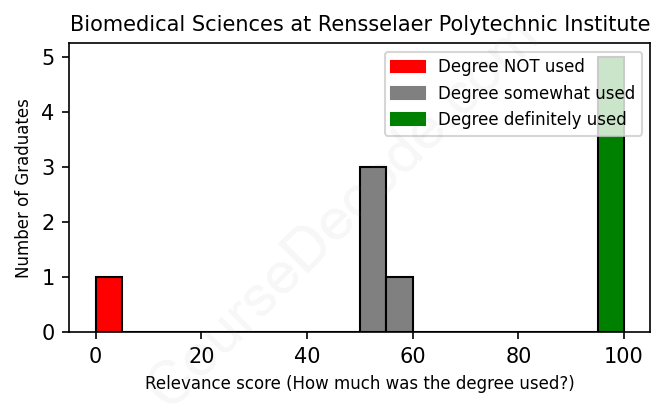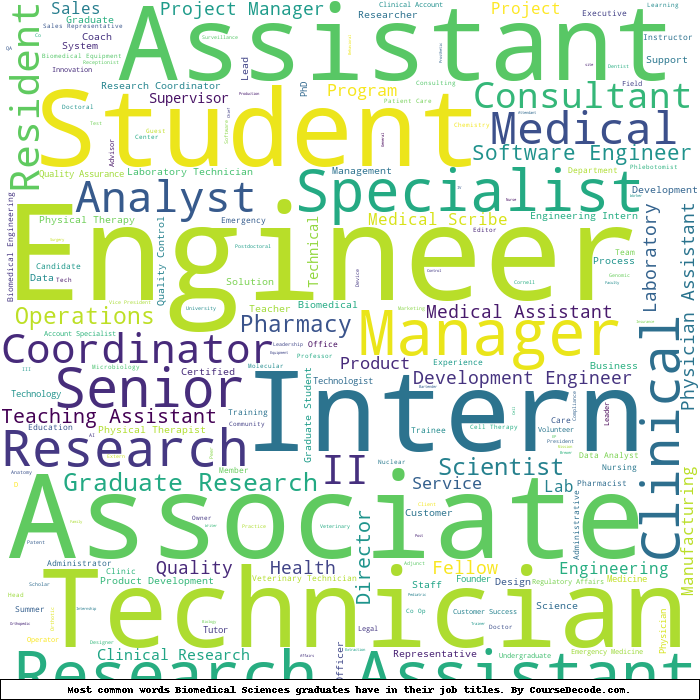
First, some facts. Of the Biomedical Sciences graduates from Rensselaer Polytechnic Institute we've analyzed , here's how many have used (or NOT used) their degree in their career:

These are estimates based on AI analysis of 10 LinkedIn profiles (see below).
The verdict? Slightly above average. Overall, with an average relevance score of 70%, Biomedical Sciences graduates from Rensselaer Polytechnic Institute have a slightly higher likelihood (+3%) of finding work in this field compared to the average graduate across all fields:
And for comparison, here's the chart for all profiles we've looked at across all degrees.
Also, after graduating, 60% of these graduates have pursued further education other than another Bachelor's degree (such as a Masters degree or other), compared to the average across all profiles of 35%. This suggests you may need more than just a Bachelors degree to be competitive as a Biomedical Sciences graduate.
See the details:
|
Relevance score: 57% We think this person has gone into a career only somewhat relevant to their degree. We think this person has gone into a career only somewhat relevant to their degree.
DEGREE INFOGraduated in 2013 from Rensselaer Polytechnic Institute with a Bachelor of Science (B.S.) in Biomedical Sciences. Also pursued further education since (see below). JOB HISTORY SINCE GRADUATIONEP-TSS Field Representative St. Jude Medical May 2013 - Oct 2014 Neurosurgery Research Assistant  Dartmouth-Hitchcock May 2015 - Aug 2015 FURTHER DEGREES DONE SINCE GRADUATINGUnknown degreeSt. Francis University 2013 - 2014 Unknown degree Tufts University School of Medicine 2015 - 2017 Unknown degree Dartmouth College 2015 - 2015 ABOUTNo information provided. |
The top 10 most common jobs done by the graduates we've analyzed (ranked most common to least) are:
When looking at the various jobs that graduates from Rensselaer Polytechnic Institute with a Biomedical Sciences degree have taken on, a clear pattern emerges with a mix of roles directly related to healthcare and research, as well as positions that stray quite far from the core focus of their education. Many of these graduates have landed positions such as Research Assistants and Engineers in biomedical setting, which are pretty much on-point for someone with their academic background. Roles at places like Tisch MS Research Center and Edwards Lifesciences show a strong connection to biomedical research and development, aligning nicely with what they studied. However, there are also quite a few who have veered off into areas like software engineering or project management, where the relevance to Biomedical Sciences is pretty minimal.
Overall, while some graduates have found excellent opportunities that utilize their Biomedical Sciences knowledge, many have taken roles that rely more on technical skills or other competencies that don't require a deep understanding of the field. Whether through internships, research positions, or engineering roles that have a tangential link to health, it’s clear that graduates have a diverse range of career paths. This reflects how adaptable the skills learned in a Biomedical Sciences program can be, but it's also a reminder that not every job directly taps into what they learned in college.
Here is a visual representation of the most common words in job titles for Biomedical Sciences graduates (this is across all Biomedical Sciences graduates we've analyzed, not just those who went to Rensselaer Polytechnic Institute):

So, looking at the career trajectories of graduates from the Biomedical Sciences program at Rensselaer Polytechnic Institute, it seems like many of them have landed pretty solid jobs that are quite relevant to their field after they finish school. Early on, right after graduation, a lot of these folks tend to start out in research roles or engineering positions, often at companies that are directly involved in health care or technological innovation related to biomedical sciences. For instance, you'll see entries like Research Engineers, R&D Engineering positions, and roles supporting healthcare services. It seems that most of these first jobs align well with their academic backgrounds, which is definitely a good sign.
Fast forward five to ten years, and you find that many of these graduates continue to advance within the biomedical or technology sectors. Some have moved into more specialized roles, such as lead analysts in health services or advanced engineering positions at reputable companies like Amazon and Lockheed Martin. There's also a presence of graduates in managerial or more integrated roles within larger companies, pointing to a healthy career growth trajectory. While there's a mix of roles that might not directly scream "biomedical sciences," the overall trend appears positive with many remaining within fields that leverage their science and engineering education. So, if you're considering a similar path, it looks like there are plenty of opportunities waiting for graduates!
Getting a Bachelor’s degree in Biomedical Sciences, especially at a place like Rensselaer Polytechnic Institute, can be pretty challenging. The coursework tends to be rigorous, with a strong emphasis on science and math, so you’ll definitely need to put in the effort to keep up with subjects like biology, chemistry, and biochemistry. There might be some group projects and lab work, which can be both fun and demanding. Overall, it’s harder than your average degree, especially if you're not super passionate about the material. But if you love science and are willing to work hard, it's totally doable and can be really rewarding!
Most commonly, in the LinkedIn profiles we've looked at, it takes people 4 years to finish a Bachelor degree in Biomedical Sciences.
Looking at the career paths of these Biomedical Sciences graduates from Rensselaer Polytechnic Institute, it seems like they've landed some decent gigs, especially considering the tech and healthcare fields tend to pay well. For instance, the software engineer roles at Amazon Web Services are likely to come with high salaries, and positions like the Associate Bioproduction Specialist at Regeneron are also promising in terms of compensation. However, some of the earlier jobs, like research assistant positions, typically don’t pay as well, as they're often entry-level. Overall, while there are some variations depending on the specific roles, it appears that many of these grads are heading towards solid incomes, especially as they gain experience and move into more specialized or advanced positions. So, it looks like they're on a good trajectory!
Here is a visual representation of the most common words seen in the "about" section of LinkedIn profiles who have a Bachelor degree in Biomedical Sciences (this is across all Biomedical Sciences graduates we've analyzed, not just those who went to Rensselaer Polytechnic Institute). This may or may not be useful:

Here are all colleges offering a Bachelor degree in Biomedical Sciences (ordered by the average relevance score of their Biomedical Sciences graduates, best to worst) where we have analyzed at least 10 of their graduates:
| College | Score | Count |
|---|---|---|
 Western Michigan University Western Michigan University
|
81 | 17 |
 Marquette University Marquette University
|
78 | 29 |
 University of Michigan University of Michigan
|
77 | 10 |
 Colorado State University Colorado State University
|
77 | 19 |
 University at Buffalo University at Buffalo
|
75 | 18 |
 California Polytechnic State University-San Luis Obispo California Polytechnic State University-San Luis Obispo
|
74 | 13 |
 University of Connecticut University of Connecticut
|
74 | 15 |
 Texas A&M University Texas A&M University
|
73 | 59 |
 Auburn University Auburn University
|
71 | 26 |
 Northern Arizona University Northern Arizona University
|
71 | 15 |
 Rensselaer Polytechnic Institute Rensselaer Polytechnic Institute
|
70 | 10 |
 University of Central Florida University of Central Florida
|
69 | 26 |
 University of South Florida University of South Florida
|
68 | 48 |
 Georgia Institute of Technology Georgia Institute of Technology
|
67 | 41 |
 The Ohio State University The Ohio State University
|
64 | 14 |
 Rochester Institute of Technology Rochester Institute of Technology
|
64 | 12 |
 Case Western Reserve University Case Western Reserve University
|
63 | 12 |
 Grand Valley State University Grand Valley State University
|
59 | 35 |
 Arizona State University Arizona State University
|
58 | 12 |